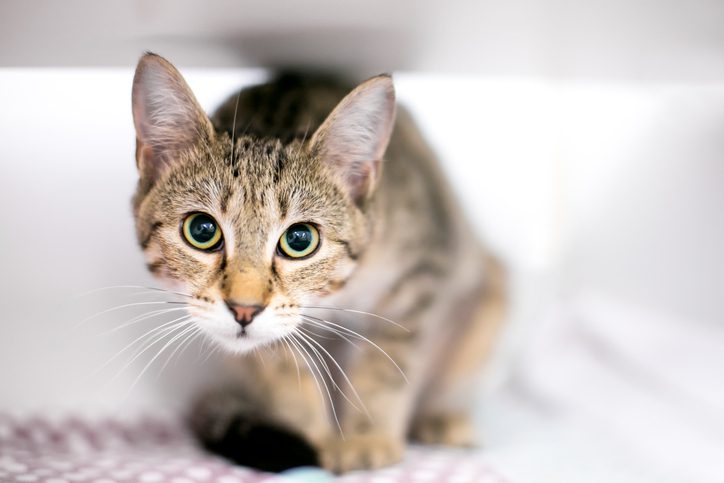Cats sometimes do not get enough credit for having feelings of attachment toward their owners. While not all cats miss their humans when they leave home, many cats have a very hard time when they are left alone. A lot of cats do enjoy the company of their owners, even if they are not as demonstrative about this fact as dogs can be.
If you have been wondering if your cat might be suffering from separation anxiety, there are some signs that you can look for to help identify this condition. Knowing if your cat is feeling anxious when you leave home is important. Many negative cat behaviors can be traced to separation anxiety which can be addressed.

6 Signs Your Cat Has Separation Anxiety
If you are ready to learn some more about whether your cat has separation anxiety, you need to keep reading.
1. Excessive Meowing
When cats are not happy about being alone, they can meow very loudly and persistently. They might even sound like they are moaning. You might have observed this behavior in your cat if you go into another room and close the door. This can be a big problem if your cat engages in this behavior when you are away from home, and your neighbors do not appreciate all the noise they are making.
While some cats are very talkative at all times, most cats only engage in this kind of meowing when they are feeling worried and separated from other pets in the home or their people.
2. Excessive Grooming
Cats that are not feeling safe will often groom obsessively. This can lead to all kinds of issues with their coat and their skin. Cats that groom too much can rip out their hair so badly that they might bleed. They might also develop skin conditions related to bacteria or fungus that can get to the skin when it is wet or injured from too much grooming. Hot spots and other unsightly and uncomfortable skin problems might also occur due to excessive grooming.
3. Vomiting and Hairballs
Cats that are upset might groom too much, which can lead to hairballs that cause vomiting. Your cat might also be vomiting just due to stress. Stomach upsets can be linked to an unwillingness to eat or drink in your absence which can cause distress to your cat’s organs. Hydration is critical for your cat’s well-being, but some cats will just hide and refuse to come out to eat or drink until their owner is home. This can lead to kidney failure and other significant disease processes when it is not attended to.
4. Eliminating Outside the Box
Many cats that are having issues with using other places in the house as a toilet instead of their litter box actually have anxiety. This can also be a sign of bladder issues or bladder pain, so you will want to be sure that you take your cat to the veterinarian if they are not using its litter box. You might only notice this behavior when you are away but finding out the root cause is important. When your cat is not using the litter box due to fear, they might just be too scared when you are away to come out from where it has been hiding to do their business.
5. Destructive Behavior
Some cats show their unhappiness with your absence by clawing or damaging things in your home. You can supply your cat with cat-friendly items that can be scratched, but you might not see an improvement in this problem if your cat is scratching because it is scared when you are not home. This can be one of the most frustrating ways that your cat expresses their loneliness when you are away.
6. Trying to Run Out Doors and Windows
Some cats will get so panicked when they are alone that they will run through the first door or window that is opened. This behavior can lead to cats getting onto the balcony of apartments, or it can lead to cats that go missing because they ran away from home. You will want to be sure that you are being very careful about opening doors and windows when your cat is experiencing issues with separation anxiety.
How to Help Separation Anxiety
The best thing that you can do for your cat that has separation anxiety is to take them to the vet. Your vet will rule out physical reasons for their behavior, and they can also prescribe some calming medications that might make your cat more laidback when you are away. You might also need to be sure that your cat has company by getting another pet for the home, or you can invest in some cat-friendly white-noise makers to help make your cat feel safer when you are away from the house.
Many cats will improve in their anxious behavior if they are given some support for their needs. Making sure that you have ruled out pain or other physical reasons for the anxiety your cat is experiencing is important so that treatment can be handled correctly.
Cat Separation Anxiety Can be Managed
Working with your vet is important when you are seeking solutions for your cat’s separation anxiety. There are so many reasons that your cat might be feeling this kind of fear when you are away from home, and the more effective your solutions are, the less likely it will be that this behavior will become ingrained. Taking care of your cat’s anxiety will help them to feel more bonded to you and will help to prevent your cat from running away through an open door or escaping out an open window. Cat separation anxiety is always better when managed properly, and your cat will thank you for making an effort to help them to feel better and safer when you need to leave them home alone.
Call 412-373-8580 to talk with your Northern Pike Veterinary Hospital team about your cat’s separation anxiety!

